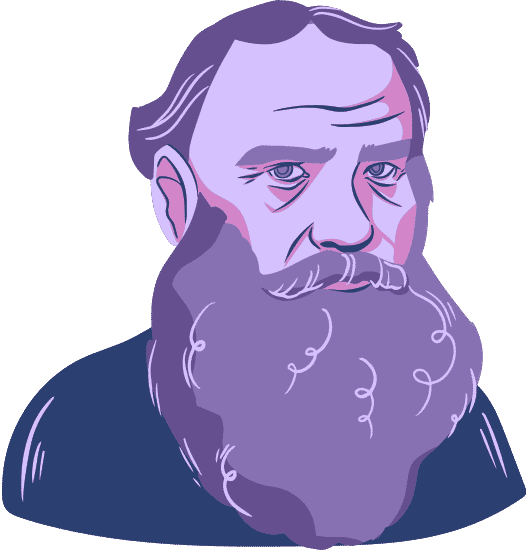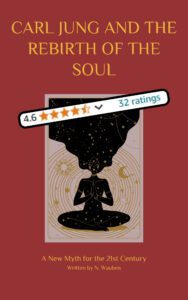Resurrection was the last novel written by Leo Tolstoy. It is not as famous as War and Peace or Anna Karenina, however, in my opinion it is an equally interesting book. Throughout the book Leo Tolstoy shares some of his most important ideas and philosophies.
Table of Contents
Introduction to Resurrection
Resurrection tells the story of the rich aristocrat Dmitri Nekhlyudov. Nekhlyudov is a member of a jury that must decide the faith of a young woman charged with murder. It turns out that this young woman, Maslova, is known to Neklyudov. In fact, it is through Neklyudov wrongdoings in the past to Maslova, that she ended up in court. Nekylydov decides to do what ever is in his power to correct his wrongdoings and fight for forgiveness from Maslova as well as from himself.
Neklyudov tries to find out how he could have become such a bad and corrupt man and how he can find forgiveness. He discovers that society played an important role in corrupting him. Even though the story is set in 19th century Russia, many of the faults that Neklyudov finds in society, are still relevant today. The lessons that Neklyudov learns throughout this period of shame and regret might therefore be interesting to pay attention to.

Lesson 1: Good and evil are relative
According to Tolstoy, the things that one considers to be good and evil largely depend on the circle in which one is moving. In Resurrection Leo Tolstoy defends this argument by indicating that people, who by the majority would be considered to be evil, do not always consider themselves as such; because they move in circles that advocate their specific modes of life:
“People whom fate and sin-mistakes have placed in a certain position, however false that position may be, form a view of life in general which makes their position seem good and admissible. In order to keep up their view of life, these people instinctively keep to the circle of those people who share their views of life and their own place in it.” (p.156)
Tolstoy indicates that this might appear rather strange to must people. However, according to Tolstoy this is only the case because most people do not move in these circles: “This surprises us only because the circle, the atmosphere in which these people live, is limited, and we are outside it.” (p.Ibid)
Even more interesting, Tolstoy argues that most people, who consider themselves to be good, are doing the exact same thing as the people that most people consider to be bad:
“But can we not observe the same phenomenon when the rich boast of their wealth, i.e., robbery; the commanders in the army pride themselves on victories, i.e., murder; and those in high places vaunt their power, i.e., violence? We do not see the perversion in the views of life held by these people, only because the circle formed by them is more extensive, and we ourselves are moving inside of it.” (p.157)
As such, it can be argued that what one considers to be good or bad largely depends on the circle in which one is moving. This would mean that there is no absolute good or evil, only relative good and evil.
Lesson 2: Society can be corruptive
Through the character Neklyudov, Leo Tolstoy argues that everyone has two personalities, his or her animal personality and his or her spiritual personality. In Resurrection Leo Tolstoy observed that the animal personality is always looking for easy gratifications. It is gratified by following the customs of society and adapting oneself to these customs. Following one’s spiritual life is more complicated because one must make every decision for oneself, instead of simply behaving as society expects one to behave.
Tolstoy’s character Neklyudov noticed that when he tried to do something that was better for his spiritual side, such as drinking less wine, spending less money on luxuries or being kind to the less fortunate, society frowned upon this behaviour. At the same time, when Neklyudov drank a lot and spend his money on luxuries society greeted this behaviour with approval: “When he considered it right to limit his needs, wore an old overcoat, took no wine, everybody thought it strange and looked upon it as a kind of showing off; but when he spent large sums on hunting or on furnishing a peculiar and luxurious story for himself, everybody admired his taste and gave him expensive presents to encourage his hobby.” (p.49)
As such it is easier, according to Tolstoy, to take better care of one’s animal personality. One does not have to make any complicated decisions for oneself because one can simply follow what everyone in society does, and one will not be frowned upon by society for being different.
However, according to Tolstoy, by only listening to one’s animal personality one might negatively influence the happiness of the world in general: “In Neklyudov, as in every man, there were two beings: one the spiritual, seeking only that kinds of happiness for himself which should tend towards the happiness of all; the other, the animal man, seeking only his own happiness, and ready to sacrifice to it the happiness of the rest of the world.” (p.54)
Even though society promotes the development of the animal personality, it is the animal personality that can eventually negatively impact society. As such, by only promoting the development of the animal personality, society can be seen as a corruptive force.
Lesson 3: People are like rivers
In Resurrection Leo Tolstoy proposes that it is almost impossible for any one person to have certain fixed characteristics: “One of the most widespread superstitions is that every man has his own special, definite qualities; that a man is kind, cruel, wise, stupid, energetic, apathic, etc.” (p.200) Tolstoy indicates that it is possible for certain individuals to more often be wise than stupid, for example, but it is not possible for anyone to always be stupid or wise: “it would be false to say of one man that he is kind and wise, of another that he is wicked and foolish. And yet we always classify mankind in this way.” (Ibid)
Instead, Tolstoy argues that ‘men are like rivers’ every man or woman has in him or herself all the attributes that can possibly exist, but some people show certain attributes more than others:
“Men are like rivers: the water is the same in each, an alike in all; but every river is narrow here, is more rapid there, here slower, there broader, now clear, now cold, now dull, now warm. It is the same with men. Every man carries in himself the germs of every human quality, and sometimes one manifests itself, sometimes another, and the man often becomes unlike himself, while still remaining the same man.” (Ibid)
It can be a pleasant idea to always consider oneself like a river. If one considers oneself to be smart, one does not have to beat oneself up for doing something stupid, because being stupid is an attribute carried by all. Similarly, if one considers oneself as someone who is always happy, one does not have to worry if one is sometimes unhappy, unhappiness is also an attribute carried by all. It all just depends on how the river flows.

Lesson 4: We do not live solely for our own joy
On the last page of his last novel, Leo Tolstoy, arguably the greatest author to have ever existed, made an interesting argument. In Resurrection Leo Tolstoy indicated that we do not live only for our own joy. Furthermore, if we were to live solely for our own joy, Tolstoy argued that it would make us unhappy: “This evidently is an incongruity. We were sent here by someone’s will and for some reason. And we have concluded that we live only for our own joy, and of course we feel unhappy.” (p.465)
Tolstoy thereby argued that everyone should have an additional purpose in life, besides living for one’s joy. Although I believe Tolstoy considered religion an important addition, everyone can find their own additional purpose.
Thank you for reading! If you enjoy reading about Russian authors, then you might also enjoy my post about Fyodr Doestoevsky’s poem: The Grand Inquisitor.

